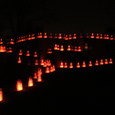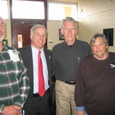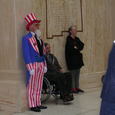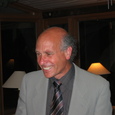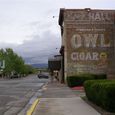« How About a Little Recogntion for our Hosts | Main | Lakoff's Framing »
Friday, November 26, 2004
What Is a Liberal?
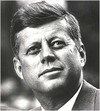 At a time when the word "liberal" has been tarred and feathered by right-wing think tanks, media pundits, Red State Republicans and even the DLC wing of the DNC, I think it's a good idea to contemplate what the word really means. Here's what President John Kennedy had to say on the topic back in 1960:
At a time when the word "liberal" has been tarred and feathered by right-wing think tanks, media pundits, Red State Republicans and even the DLC wing of the DNC, I think it's a good idea to contemplate what the word really means. Here's what President John Kennedy had to say on the topic back in 1960:
What do our opponents mean when they apply to us the label "Liberal?" If by "Liberal" they mean, as they want people to believe, someone who is soft in his policies abroad, who is against local government, and who is unconcerned with the taxpayer's dollar, then the record of this party and its members demonstrate that we are not that kind of "Liberal." But if by a "Liberal" they mean someone who looks ahead and not behind, someone who welcomes new ideas without rigid reactions, someone who cares about the welfare of the people -- their health, their housing, their schools, their jobs, their civil rights, and their civil liberties -- someone who believes we can break through the stalemate and suspicions that grip us in our policies abroad, if that is what they mean by a "Liberal," then I'm proud to say I'm a "Liberal."
But first, I would like to say what I understand the word "Liberal" to mean and explain in the process why I consider myself to be a "Liberal," and what it means in the presidential election of 1960.
In short, having set forth my view -- I hope for all time -- two nights ago in Houston, on the proper relationship between church and state, I want to take the opportunity to set forth my views on the proper relationship between the state and the citizen. This is my political credo:
I believe in human dignity as the source of national purpose, in human liberty as the source of national action, in the human heart as the source of national compassion, and in the human mind as the source of our invention and our ideas. It is, I believe, the faith in our fellow citizens as individuals and as people that lies at the heart of the liberal faith. For liberalism is not so much a party creed or set of fixed platform promises as it is an attitude of mind and heart, a faith in man's ability through the experiences of his reason and judgment to increase for himself and his fellow men the amount of justice and freedom and brotherhood which all human life deserves.
I believe also in the United States of America, in the promise that it contains and has contained throughout our history of producing a society so abundant and creative and so free and responsible that it cannot only fulfill the aspirations of its citizens, but serve equally well as a beacon for all mankind. I do not believe in a superstate. I see no magic in tax dollars which are sent to Washington and then returned. I abhor the waste and incompetence of large-scale federal bureaucracies in this administration as well as in others. I do not favor state compulsion when voluntary individual effort can do the job and do it well. But I believe in a government which acts, which exercises its full powers and full responsibilities. Government is an art and a precious obligation; and when it has a job to do, I believe it should do it. And this requires not only great ends but that we propose concrete means of achieving them.
Our responsibility is not discharged by announcement of virtuous ends. Our responsibility is to achieve these objectives with social invention, with political skill, and executive vigor. I believe for these reasons that liberalism is our best and only hope in the world today. For the liberal society is a free society, and it is at the same time and for that reason a strong society. Its strength is drawn from the will of free people committed to great ends and peacefully striving to meet them. Only liberalism, in short, can repair our national power, restore our national purpose, and liberate our national energies. And the only basic issue in the 1960 campaign is whether our government will fall in a conservative rut and die there, or whether we will move ahead in the liberal spirit of daring, of breaking new ground, of doing in our generation what Woodrow Wilson and Franklin Roosevelt and Harry Truman and Adlai Stevenson did in their time of influence and responsibility.
Our liberalism has its roots in our diverse origins. Most of us are descended from that segment of the American population which was once called an immigrant minority. Today, along with our children and grandchildren, we do not feel minor. We feel proud of our origins and we are not second to any group in our sense of national purpose. For many years New York represented the new frontier to all those who came from the ends of the earth to find new opportunity and new freedom, generations of men and women who fled from the despotism of the czars, the horrors of the Nazis, the tyranny of hunger, who came here to the new frontier in the State of New York. These men and women, a living cross section of American history, indeed, a cross section of the entire world's history of pain and hope, made of this city not only a new world of opportunity, but a new world of the spirit as well.
Go ahead and read the entire speech.
November 26, 2004 at 12:30 PM in Democratic Party | Permalink

